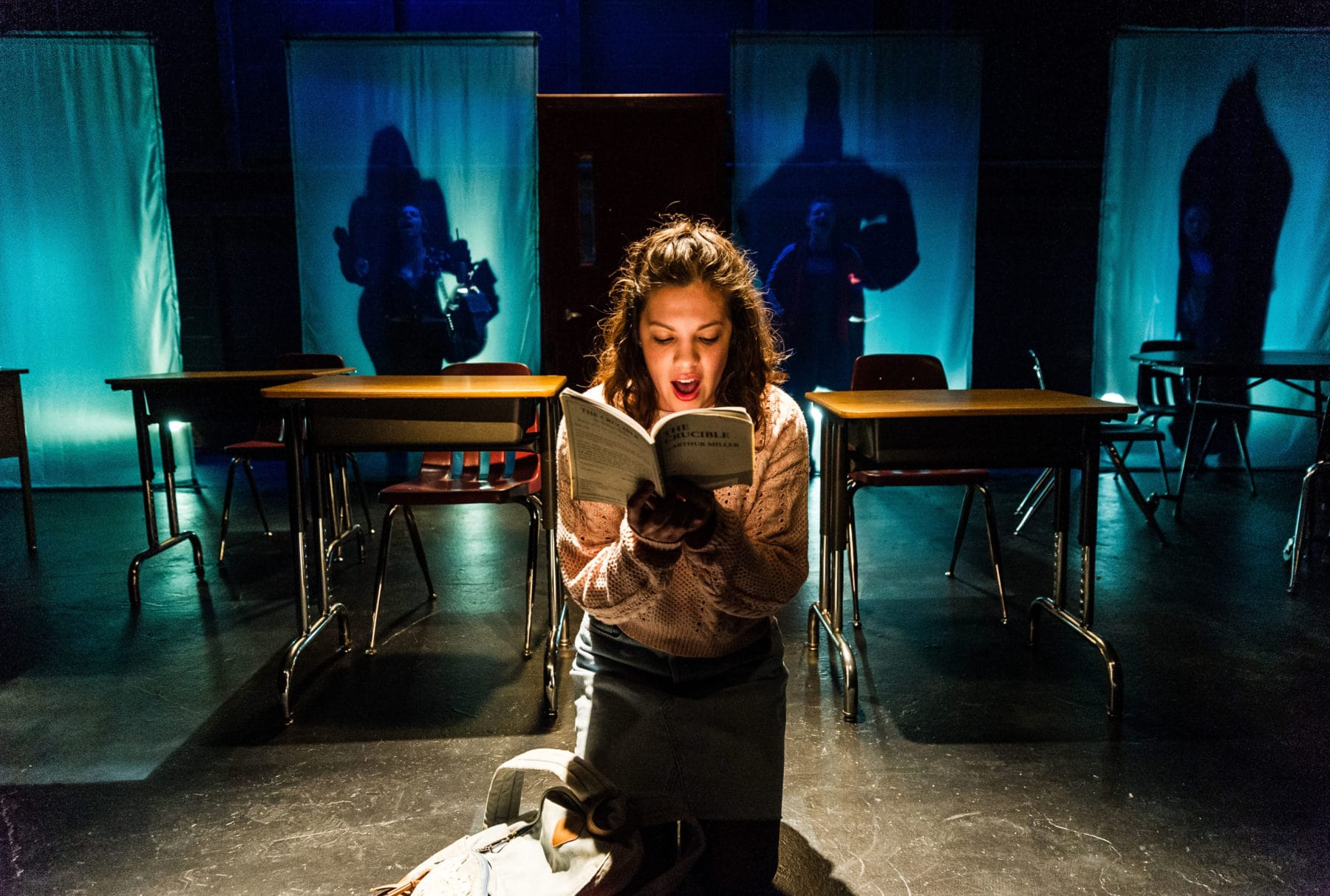The Hub is off to a remarkable start under new Artistic Director Matt Bassett with their production of The Burn by Philip Dawkins. Featuring snippets from the Arthur Miller classic The Crucible (1953), The Burn is about bullying (online and IRL), but so much more than that. The demonization of the Other, which is increasing in our society as well as around the world, is portrayed here with accuracy and compassion. The play was originally presented at Steppenwolf Theatre Company in Chicago (2018); this is a regional premiere.

The term “witch-hunt,” overused in recent years, was originally applied to a series of prosecutions of witches in Salem, Massachusetts, from 1692-1693 which resulted in over 200 accusations and 20 executions. In The Crucible, Miller offered a fictionalized account of the story, which involves mass hysteria leading to the conviction of innocent people. Even in his stage directions, Miller noted similarities between these trials and the anti-Communist McCarthyism panic of the 1950s. The famed Congressional hearings, which were run initially by Wisconsin Republican Senator Joseph McCarthy and his chief counsel Roy Cohn, entailed allegations of the presence of Communists in government, labor unions, academia, and the entertainment industry.
In a thoughtful interview with my colleague David Siegel, Bassett states that The Burn uses a high school production of The Crucible to examine anonymity in the social media age and what being a person really means.
Here, although much of the harassment is personal, the online element takes a shocking turn which causes the audience to reevaluate our opinions of all the characters and their situation.
The first thing we see is a student acting out a scene from The Crucible. She is Mercedes (Gabby Wolfe), the new girl in class. The teacher is Erik (Elliott Kashner) a well-meaning, knowledgeable drama/English teacher. There are three other girls: Tara (Chloe Mikala) who is well-off but whose home life sounds chaotic; Shauna (Rae Venna), the kind of girl whose discreet demeanor allows her to get away with everything, and Andi (Christina Day) the jock of the group, who is gay and full of overwhelming energy. They are astonishingly nasty to Mercedes, who has a history of trauma and is deeply religious. They surround her with a series of insults: she’s so fat she… she’s so ugly she….she’s so stupid she….
The dialogue is a wonderful example of teen-speak, funny, on-target, and sometimes emotionally moving. Playwright Philip Dawkins creates a believable high school world, with its own signs and traditions, and its own secret tensions and rivalries.
Wolfe’s Mercedes is quiet and sincere. She irritates the other girls because she has something that they do not: a moral compass. She is also tactless enough to announce her spiritual beliefs whenever possible, which makes her classmates feel judged. She has a tragedy in her past. But they don’t know that.
Mikala’s Tara is the ringleader, and she is looked up to by the other girls. She appears to be utterly without remorse. Mikala is outstanding in this difficult role.
Shauna, played by Rae Venna, has some capacity for empathy. She has some touching scenes with Wolfe’s Mercedes, beautifully acted, where we see how a strong friendship could have evolved between them in another time and place.
Andi, the athlete of the group, has a unique verbal style, but must suffer the taunts of her alleged friends about her sexuality and relationship with the female gym teacher. Day’s performance, like that of the other girls, is pitch-perfect.
Kashner’s Erik is an anomaly in this setting, a genuinely decent person who is trying to do the right thing. He reaches out to Mercedes and attempts to help her, with no ulterior motives and a combination of reticence and subdued charm. His character is essentially the ethical center of the play, and his subtle honesty keeps us from finding him self-righteous or, worse, a moral bully himself.
Elizabeth Zuck’s set design is perfectly suited to the needs of the production. Mercedes’ tormentors are sometimes silhouetted, adding a pleasantly eerie touch to the proceedings. Lighting Design is by Catherine Girardi, and Sound Designer is Reid May. Costumes, by Grace Mitchell, give us additional insight into the characters of the girls and their beleaguered teacher. The technical team’s work as a whole is first-rate.
Director Bassett noted, in his after-party speech, that in his view “The Hub” is re-created every time there is a performance. We are all gathered together, in person, at this one moment, to hear a story which is of importance to the tribe. If you make your way to NextStop Theater in Reston, which is currently hosting The Hub, you will find a hidden treasure. The Burn is a richly entertaining analysis of mean-spiritedness and its consequences, which is deeply relevant to the time and place in which we find ourselves.
Running Time: 90 minutes, with no intermission.
The Burn, presented by The Hub Theatre, plays through May 11, 2019, at NextStop Theatre Company, 269 Sunset Park Drive, Herndon, VA. For tickets, go online.




